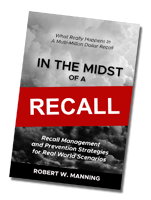Rushdi Foods Issues a Voluntary Recall on One Lot of Their Mighty Sesame Organic Tahini 10.9 oz Squeeze Bottle
Company Announcement
Bayonne, NJ. (May 3, 2023) – Rushdi Food Industries, an Israeli based manufacturer, is voluntarily recalling their Mighty Sesame 10.9 Oz Organic Tahini (Squeezable) with the specific
expiration date of 9/25/23 due to potential Salmonella contamination. Salmonella is an organism which can cause serious and sometimes fatal infections in young children, frail or elderly people,
and others with weakened immune systems. Healthy persons infected with Salmonella often experience fever, diarrhea (which may be bloody), nausea, vomiting and abdominal pain. In rare
circumstances, infection with Salmonella can result in the organism getting into the bloodstream and producing more severs illnesses such as arterial infections (i.e., infected aneurysms),
endocarditis and arthritis.
This recall was initiated when the company received a notification by the FDA and the Ohio Department of Health of the potential presence of Salmonella in this specific lot. The company
has received no reports of illness or injury to date. We immediately informed all Stores who had purchased this product within this lot code about this Recall and instructed them to remove any
product which might be on their shelves.
RECALL REVIEW
What is Salmonella and why is it dangerous? What are some sources of Salmonella in a manufacturing facility? How can you prevent it from entering your production stream?
Salmonella is a Gram-Negative bacterium and can be found in raw and under cooked foods, such as poultry, but also is known to survive for long periods of time in low moisture foods and can be
problematic for some industries, such as, flour, nuts and nut products, chocolate and cocoa, dry milk powders, dry cereals, and spice manufacturing.
Salmonella lives in the gastrointestinal tract of many wild and domestic animals, especially birds, and infected humans. Salmonella has many species which have been responsible for food
recalls.
Sources of Salmonella can originate from:
- Incoming ingredients.
- Food handlers and production employees.
- Under prepared and under cooked foods.
- Cross-Contamination from raw to cooked products.
- Improper storage temperatures for raw and finished products.
- Ingredients that have been improperly handled.
- Contaminated processing utilities, i.e., water, ice, etc.
- Infrastructure breaches into the manufacturing environment, i.e., roof and wall leaks.
- Formation of biofilms and biomasses from unclean equipment.
- Movement of pathogens throughout the facility due to foot traffic.
What can you do to reduce Salmonella from entering your production stream?
- Train employees on why GMP’s are important and ensure they follow them. It is also critical that Management leads by example.
- Determine the foot traffic and see if your facility is at risk. Understand environmental monitoring and use data to drive your decision-making process.
- Review your receiving practices and monitor what is being delivered. It is also important to inspect the pallets since they are reused and may contain hazardous, unsafe, and unwanted materials.
- Understand what microbes your incoming ingredients possess and at what levels, etc. Determine a program to monitor incoming ingredients and to assure you are keeping your supplier to their COA (Certificate of Analysis).
- Evaluate your product storage areas and ensure temperature controls are accurate and being maintained.
- Review your preparation and thermal treatment process to assure it is per your established standards.
- Establish inspection procedures during inclement weather and heavy rain events to look for potential breaches.
- Have a communication and escalation procedure to notify management of water leaks within the facility.
- Look for condensation and dripping pipes, especially over product contact zones and adjacent areas.
- Praise employees for their findings and reward prevention activities.
As always, following any findings there should be some type of review process (Postmortem, After Action Report (AAR), Root Cause Analysis (RCA), etc. with communications going out to the organization to prevent a re occurrence.
Together we can all do our part to be advocates for prevention and drive out recalls worldwide!
 Want to read more Case Studies? Check out my book “In the Midst of a Recall” for real-world measures you can take now to prepare with in-depth Case Studies. Available now
Want to read more Case Studies? Check out my book “In the Midst of a Recall” for real-world measures you can take now to prepare with in-depth Case Studies. Available now
Source(s): USFA recall alert




